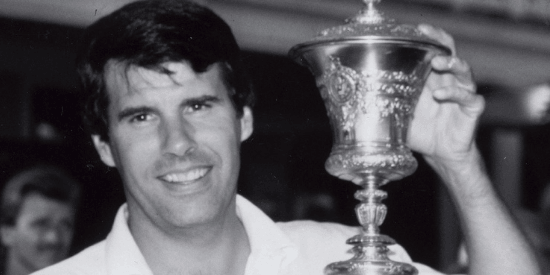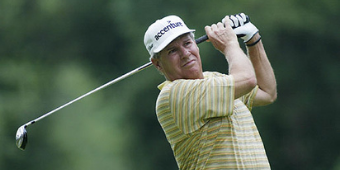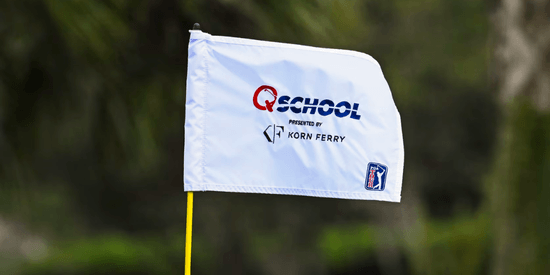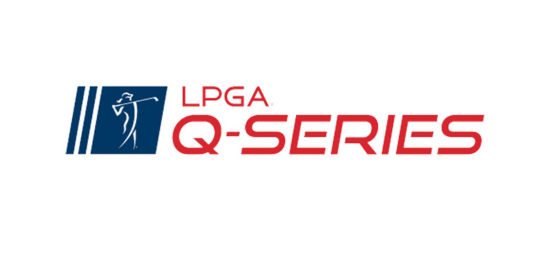Catching up with Jay Sigel
6/17/2021 | by Rick Woelfel of AmateurGolf.com

One of golf's most accomplished amateurs looks back on his illustrious career
Apart from Bobby Jones, Robert Jay Sigel is arguably the most celebrated amateur in the history of American golf. Before turning professional at age 50, he had accumulated five USGA national championships, as well as a British Amateur title, nine Walker Cup appearances (two as a playing captain) and 11 trips to the Masters.
His record will likely never be equaled because of how amateur golf has evolved over the last half century and the astronomical odds against a career amateur replicating his accomplishments.
His illustrious record includes, among other things, winning the British Amateur Championship in 1979, U.S. Amateur titles in 1982 and ’83, and U.S. Mid-Amateur in 1983, ’85, and ’87. That Sigel achieved all this while raising a family and running a successful business is particularly noteworthy.
“Golf Digest had a ranking of the amateurs,” he recalls. “And I was ranked in the top 10 from 1975 until 1991. It’s incredible in that I was playing against all the scholarship kids from college. I’m raising a family, I’m running a business, I’m paying all my expenses. I couldn’t do that again.”
Sigel is justifiably proud of what he accomplished as a competitor. But it’s safe to say nothing gave him more pleasure than representing his country, particularly in the Walker Cup matches. “To represent your country, represent your community, your club, your school, your friends, your teammates, and the USGA is really a great thing,” he said. “For me, it came later in life which was really special (Sigel played in his first Walker Cup in 1977 at age 34).
“Most of the guys were in college or just recently out so I think it meant more to the true amateur, the guy who is working. That kept me in the game.”
In addition to his nine Walker Cup appearances, he was part of seven U.S. World Amateur teams.
Sigel has always been committed to giving back to the game. In 1980 he assumed the presidency of the Greater Philadelphia Scholastic Golf Association, which later evolved into First Tee.

At that point in his career, Sigel had won the British Amateur, plus several domestic amateur titles, and had played in two Walker Cups. He felt an obligation to support the game that given him so much, after his hopes of playing on the PGA Tour were dashed in the wake of a hand injury he sustained while in college at Wake Forest. The accident drove home the value of an education and the importance of giving back.
“I needed to pay back for everything I’d received,” he said. It was time for me to give back.” Sigel’s involvement began via a tournament for the best scholastic golfers in the Philadelphia area, an event that led to the creation of the GPSGA.
In addition to serving as the organization’s president, Sigel helped finance the construction its headquarters building/clubhouse. Even as he became one of the most accomplished competitors in amateur golf he remained steadfast in his involvement. Four decades later, he is still involved with the GPSGA as its president emeritus.
“We’re paying it forward is what we’re doing,” he said. “Even though I’m emeritus at the moment. I’m still involved and do things. It’s good thing I had that to give back to.”
The landscape of amateur golf has changed in the 36 years since Sigel won his first national-level amateur event, the 1975 Porter Cup. For much of his amateur career, members of the Walker Cup and World Amateur teams traditionally received Masters invitations. That practice was discontinued prior to the 1989 Masters.
Sigel, who played in 11 consecutive Masters from 1978-88 expressed his disappointment with decision at the time and remains puzzled by it today.
“Clifford Roberts and Bobby Jones always wanted to have a spot for amateurs,” he said (in that era there were usually between eight and 10 in the Masters field each year). I think that’s very interesting for the public to see those guys. To see how they would do is I think of interest.
“It was stated that the amateur would always have a place there. They cut that back because they felt the field was too large. The fields went back to 80-85 players instead of 95. “I don’t know really why that happened. I was disappointed, when in fact every year we were there we were told we would always be invited back.”
For years, it was common for college players with PGA Tour ambitions to turn professional as soon as possible. This trend became so pronounced that it became difficult for the USGA to convince players to retain their amateur status long enough to compete in events like the Walker Cup.
Sigel applauds how the USGA has dealt with this circumstance.
“(The USGA) worked closely with the tours and they have what they call PGA Tour University,” he said. “What the tour and amateur golf do is they take the amateur rankings. They will take the top five players over the last two years (provided they stay in college for four years) and exempt them into the Korn Ferry Tour. Players ranked six through 15 have access to PGA Tour Latinoamérica in Latin and South America and the Mackenzie Tour in Canada.
“That’s a huge thing. There is reason for an amateur to turn pro but the USGA and the tour want them to at least get through college. It doesn’t say you have to graduate. I think that’s a tremendous step in the right direction.”
Sigel, who attended the recent Walker Cup at Seminole, is comfortable with the concept of the Great Britain and Ireland side appointing a professional golfer as its captain. He does not want to see the USGA go down that road however. Sigel himself served as the United States’ playing captain in 1983 and ’85.
“I voiced my thoughts on that to the USGA,” he said. It’s come about because, as the captain, you have some input into who is selected and there are some travel and expense requirements. And the economy across the water is not the same as it is over here. So, it difficult for the individual, I understand that.
“But I also understand that we have some great amateurs who’ve given of themselves, who’ve played Walker cup, who’ve won U.S. Mid-Amateurs.
“They’re sort of in the queue. It’s been suggested and written about that they’re going to be our captains of the future. You cannot avoid selecting them. (Players like) Nathan Smith, Scott Harvey, Todd White, Mike McCoy, Stewart Hagestad who was on the recent Walker Cup team.
“I’ve told the USGA I’m fine with (Great Britain and Ireland) having a pro as their captain. But I would like to have our captain be an amateur golfer, particularly since it’s been stated that they would most likely be a captain. You can’t just push that aside.”
For nearly three decades, Sigel has hosted a charity golf event at Aronimink Golf Club just outside Philadelphia, where he has been a member for most of his life. The Jay Sigel Invitational has raised some $4 million for the ongoing fight against prostate and breast cancer. Those funds benefit the Abramson Family Cancer Research Institute at the University of Pennsylvania.
The event is extremely popular; as many as 170 golfers have participated in a single year. Last year’s tournament attracted 110 participants and raised $250,000 at a time when many charity golf events were being cancelled because of the Covid-19 pandemic.
“Other events were being cancelled, postponed for a year,” Sigel said. “We didn’t want to do that. We wanted to keep our name out there. We’ve had a lot of success.”
Apart from the dollars raised, the tournament has been an impetus to encourage people to visit their doctors for a checkup, individuals who might otherwise be reluctant to do so.
“We’ve had people ask to speak, they come out of the audience, and say ‘I just want you to know, my knowledge through attending this event saved my life’” Sigel said. “It’s really very rewarding.”
The 29th edition of the Jay Sigel Invitational is scheduled for September 20 at Aronimink. In the meantime, the tournament host is staying busy. When he isn’t playing golf with friends, he’s in demand as a speaker.
“I speak a lot,” Sigel said, “just tell stories about how fortunate I’ve been, how great the game is, how great people are for taking care of one another. We’re one big family. paying it forward is great.
“I just try to give back as much as I can. Play golf with my buddies, meet new people and have good time.”
Siegel’s wife Betty has always supported his golf ambitions and understood his passion for the game. The couple has been married 53 years and have three daughters and five grandchildren.
Sigel notes that when he and his wife were first married, she was asked if she was going to ask him to cut back on his golf.
“Her response was ‘Why was I going to ask him to cut back when this is what he’s done forever?’” he recalls. “I thought that was a pretty good answer and one that I’ve appreciated. She’s often said to me, ‘You’re driving me crazy, would you go play golf.’”
The Sigel File
Born: Nov. 13, 1943 in Bryn Mawr, Penn.
Resides: Berwyn, Penn.
Alma Mater: Wake Forest ‘67
Wife: Betty
Children: Jennifer, Amy, Megan
Team Appearances
Walker Cup (9): 1977, ’79, ’81, ’83, ’85 (playing captain), ’87 (playing captain), ’89, ’91, ‘93
U.S. World Amateur Team (7): 1987, ’80, ’82, ’84, ’86, ’88, ‘92
Notable Amateur Wins
1961 International Jaycee Junior
1973 Philadelphia Amateur
1974 Pennsylvania Open
1975 Porter Cup, Pennsylvania Open
1976 Sunnehanna Amateur
1977 Pennsylvania Open
1978 Sunnehanna Amateur, Pennsylvania Open
1979 British Amateur
1980 Pennsylvania Open
1981 Porter Cup
1982 U.S. Amateur
1983 U.S. Amateur, U.S. Mid-Amateur, Pennsylvania Open
1984 Northeast Amateur
1985 Northeast Amateur, U.S. Mid-Amateur
1986 Pennsylvania Open
1987 Porter Cup, U.S. Mid-Amateur, Philadelphia Amateur, Pennsylvania Open
1988 Sunnehanna Amateur
1990 Pennsylvania Open
1991 Northeast Amateur
Champions Tour Wins
1994 GTE West Classic
1996 Energizer Senior Tour Championship
1997 Bruno’s Memorial Classic, Kroger Senior Classic
1998 Bell Atlantic Classic
1998 EMC Kaanapali Open
2002 Farmer’s Charity Classic
2003 Bayer Advantage Celebrity Pro-Am
His record will likely never be equaled because of how amateur golf has evolved over the last half century and the astronomical odds against a career amateur replicating his accomplishments.
His illustrious record includes, among other things, winning the British Amateur Championship in 1979, U.S. Amateur titles in 1982 and ’83, and U.S. Mid-Amateur in 1983, ’85, and ’87. That Sigel achieved all this while raising a family and running a successful business is particularly noteworthy.
Sigel is justifiably proud of what he accomplished as a competitor. But it’s safe to say nothing gave him more pleasure than representing his country, particularly in the Walker Cup matches. “To represent your country, represent your community, your club, your school, your friends, your teammates, and the USGA is really a great thing,” he said. “For me, it came later in life which was really special (Sigel played in his first Walker Cup in 1977 at age 34).
“Most of the guys were in college or just recently out so I think it meant more to the true amateur, the guy who is working. That kept me in the game.”
In addition to his nine Walker Cup appearances, he was part of seven U.S. World Amateur teams.
Sigel has always been committed to giving back to the game. In 1980 he assumed the presidency of the Greater Philadelphia Scholastic Golf Association, which later evolved into First Tee.

“I needed to pay back for everything I’d received,” he said. It was time for me to give back.” Sigel’s involvement began via a tournament for the best scholastic golfers in the Philadelphia area, an event that led to the creation of the GPSGA.
In addition to serving as the organization’s president, Sigel helped finance the construction its headquarters building/clubhouse. Even as he became one of the most accomplished competitors in amateur golf he remained steadfast in his involvement. Four decades later, he is still involved with the GPSGA as its president emeritus.
“We’re paying it forward is what we’re doing,” he said. “Even though I’m emeritus at the moment. I’m still involved and do things. It’s good thing I had that to give back to.”
The landscape of amateur golf has changed in the 36 years since Sigel won his first national-level amateur event, the 1975 Porter Cup. For much of his amateur career, members of the Walker Cup and World Amateur teams traditionally received Masters invitations. That practice was discontinued prior to the 1989 Masters.
Sigel, who played in 11 consecutive Masters from 1978-88 expressed his disappointment with decision at the time and remains puzzled by it today.
“Clifford Roberts and Bobby Jones always wanted to have a spot for amateurs,” he said (in that era there were usually between eight and 10 in the Masters field each year). I think that’s very interesting for the public to see those guys. To see how they would do is I think of interest.
“It was stated that the amateur would always have a place there. They cut that back because they felt the field was too large. The fields went back to 80-85 players instead of 95. “I don’t know really why that happened. I was disappointed, when in fact every year we were there we were told we would always be invited back.”
For years, it was common for college players with PGA Tour ambitions to turn professional as soon as possible. This trend became so pronounced that it became difficult for the USGA to convince players to retain their amateur status long enough to compete in events like the Walker Cup.
Sigel applauds how the USGA has dealt with this circumstance.
“(The USGA) worked closely with the tours and they have what they call PGA Tour University,” he said. “What the tour and amateur golf do is they take the amateur rankings. They will take the top five players over the last two years (provided they stay in college for four years) and exempt them into the Korn Ferry Tour. Players ranked six through 15 have access to PGA Tour Latinoamérica in Latin and South America and the Mackenzie Tour in Canada.
“That’s a huge thing. There is reason for an amateur to turn pro but the USGA and the tour want them to at least get through college. It doesn’t say you have to graduate. I think that’s a tremendous step in the right direction.”
Sigel, who attended the recent Walker Cup at Seminole, is comfortable with the concept of the Great Britain and Ireland side appointing a professional golfer as its captain. He does not want to see the USGA go down that road however. Sigel himself served as the United States’ playing captain in 1983 and ’85.
“I voiced my thoughts on that to the USGA,” he said. It’s come about because, as the captain, you have some input into who is selected and there are some travel and expense requirements. And the economy across the water is not the same as it is over here. So, it difficult for the individual, I understand that.
“But I also understand that we have some great amateurs who’ve given of themselves, who’ve played Walker cup, who’ve won U.S. Mid-Amateurs.
“They’re sort of in the queue. It’s been suggested and written about that they’re going to be our captains of the future. You cannot avoid selecting them. (Players like) Nathan Smith, Scott Harvey, Todd White, Mike McCoy, Stewart Hagestad who was on the recent Walker Cup team.
“I’ve told the USGA I’m fine with (Great Britain and Ireland) having a pro as their captain. But I would like to have our captain be an amateur golfer, particularly since it’s been stated that they would most likely be a captain. You can’t just push that aside.”
For nearly three decades, Sigel has hosted a charity golf event at Aronimink Golf Club just outside Philadelphia, where he has been a member for most of his life. The Jay Sigel Invitational has raised some $4 million for the ongoing fight against prostate and breast cancer. Those funds benefit the Abramson Family Cancer Research Institute at the University of Pennsylvania.
The event is extremely popular; as many as 170 golfers have participated in a single year. Last year’s tournament attracted 110 participants and raised $250,000 at a time when many charity golf events were being cancelled because of the Covid-19 pandemic.
“Other events were being cancelled, postponed for a year,” Sigel said. “We didn’t want to do that. We wanted to keep our name out there. We’ve had a lot of success.”
Apart from the dollars raised, the tournament has been an impetus to encourage people to visit their doctors for a checkup, individuals who might otherwise be reluctant to do so.
“We’ve had people ask to speak, they come out of the audience, and say ‘I just want you to know, my knowledge through attending this event saved my life’” Sigel said. “It’s really very rewarding.”
The 29th edition of the Jay Sigel Invitational is scheduled for September 20 at Aronimink. In the meantime, the tournament host is staying busy. When he isn’t playing golf with friends, he’s in demand as a speaker.
“I speak a lot,” Sigel said, “just tell stories about how fortunate I’ve been, how great the game is, how great people are for taking care of one another. We’re one big family. paying it forward is great.
“I just try to give back as much as I can. Play golf with my buddies, meet new people and have good time.”
Siegel’s wife Betty has always supported his golf ambitions and understood his passion for the game. The couple has been married 53 years and have three daughters and five grandchildren.
Sigel notes that when he and his wife were first married, she was asked if she was going to ask him to cut back on his golf.
“Her response was ‘Why was I going to ask him to cut back when this is what he’s done forever?’” he recalls. “I thought that was a pretty good answer and one that I’ve appreciated. She’s often said to me, ‘You’re driving me crazy, would you go play golf.’”
The Sigel File
Born: Nov. 13, 1943 in Bryn Mawr, Penn.
Resides: Berwyn, Penn.
Alma Mater: Wake Forest ‘67
Wife: Betty
Children: Jennifer, Amy, Megan
Team Appearances
Walker Cup (9): 1977, ’79, ’81, ’83, ’85 (playing captain), ’87 (playing captain), ’89, ’91, ‘93
U.S. World Amateur Team (7): 1987, ’80, ’82, ’84, ’86, ’88, ‘92
Notable Amateur Wins
1961 International Jaycee Junior
1973 Philadelphia Amateur
1974 Pennsylvania Open
1975 Porter Cup, Pennsylvania Open
1976 Sunnehanna Amateur
1977 Pennsylvania Open
1978 Sunnehanna Amateur, Pennsylvania Open
1979 British Amateur
1980 Pennsylvania Open
1981 Porter Cup
1982 U.S. Amateur
1983 U.S. Amateur, U.S. Mid-Amateur, Pennsylvania Open
1984 Northeast Amateur
1985 Northeast Amateur, U.S. Mid-Amateur
1986 Pennsylvania Open
1987 Porter Cup, U.S. Mid-Amateur, Philadelphia Amateur, Pennsylvania Open
1988 Sunnehanna Amateur
1990 Pennsylvania Open
1991 Northeast Amateur
Champions Tour Wins
1994 GTE West Classic
1996 Energizer Senior Tour Championship
1997 Bruno’s Memorial Classic, Kroger Senior Classic
1998 Bell Atlantic Classic
1998 EMC Kaanapali Open
2002 Farmer’s Charity Classic
2003 Bayer Advantage Celebrity Pro-Am
Most Popular Articles

2025 PGA TOUR Q-School Guide: Sites, Scores, and Who Advanced
Dec 5, 2025Second Stage is complete and Final Stage awaits at Sawgrass — follow every Q-School leaderboard and the players still chasing
2025 LPGA TOUR Q-Series: Final Qualifying Stage FINAL SCORING
Dec 8, 2025Helen Briem earns medalist honors, 31 players headed to the LPGA next year
Australian Open at Royal Melbourne: Preview, amateur bios, and how to watch
Nov 30, 2025Rory McIlroy headlines one of the championship's top fields in years - at least four amateurs will have their chance at glory
Luke Ringkamp Cruises to Rolex Tournament of Champions Title at TPC San Antonio
Nov 26, 2025One week after committing to Pepperdine, Luke Ringkamp won the Rolex Tournament of Champions by nine shots.Inside Gil Hanse’s Restoration of Baltusrol’s Upper Course: A Return to Tillinghast’s
Dec 11, 2025Renowned architect Gil Hanse reveals how he brought Baltusrol’s Upper Course back to life by honoring A.W. Tillinghast’s originalLoading latest news...
